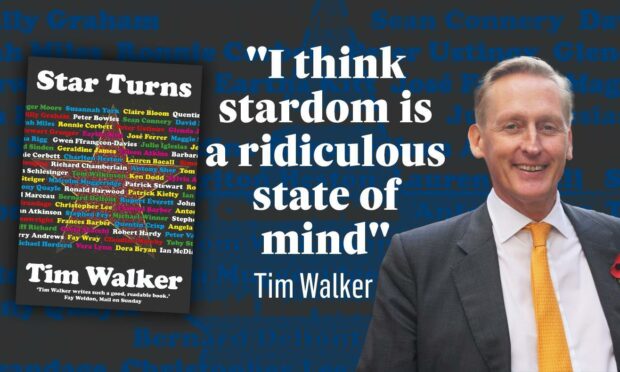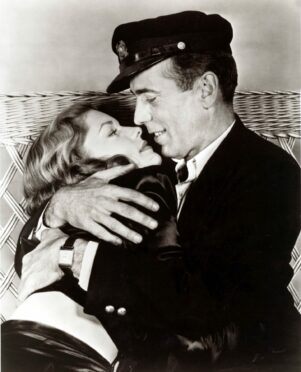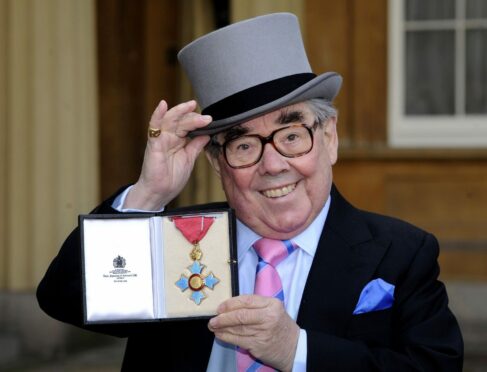He’s lunched with Lauren Bacall, played table tennis with Sarah Miles and was even torn to shreds by Stephen Fry, so it’s no surprise that journalist Tim Walker doesn’t get starstruck anymore.
“Fundamentally, I think stardom is a ridiculous state of mind,” laughs the London-based writer. “If you do genuinely think you’re a star, I think you’ve gone completely insane.”
After a long Fleet Street career interviewing the biggest screen stars of our time, he should know. Walker’s new book, Star Turns, celebrates and ridicules such insanity in equal measure.
“I remember my first week on the Observer,” he says.
“I ended up having lunch with Lauren Bacall. It was a totally ridiculous situation because her PR kept saying, ‘She’s not going to talk to you about (her first husband) Humphrey Bogart, so don’t even go there’.
“Of course, the first thing she starts talking about is Humphrey Bogart.
“The PR was dying of boredom, with these endless interviews of Bacall talking about Humphrey Bogart – but the poor thing, she was in love!”
This anecdote, in a longer form, appears at the beginning of Star Turns, and sets the tone for what’s to come.
The series of vignettes provides glimpses of some of the biggest names of the 20th and 21st centuries – from Angela Lansbury and Eartha Kitt to Hugh Grant and Sean Connery – from the eyes of a doe-eyed junior reporter growing into a veteran journalist.
But fascinatingly, Walker’s journey with stardom started long before he ever entered a newsroom.
Star quality in the genes
“My mother was a child star,” he reveals. In fact, Claudine Mawby was one of the first ever child stars – one of the three cherubic ‘Mawby Triplets’ who lit up the silver screen in the early Golden Age of 1920s and ’30s Hollywood.
“She never really boasted about it, but she worked with all the Hollywood stars – Gloria Swanson, and all those kind of people,” Walker goes on.
“She didn’t see any difference between her and them. So perhaps I didn’t have that starstruck thing about it because of her.”
Written over lockdown by combing through the archives of his New European Star Turns column, Walker reckons the book charts the “obsessions” of different ages, making it an interesting historical romp as well as a reminiscence of his own life.
“When I looked at all the cuttings I had, it kind of told a story,” he says. “Or more accurately, it shows what our obsessions are in journalism.
“For example, in all the early interviews (in the ’80s and ’90s), sex and sexuality seem to matter a huge amount. Of course now, the thing that gets people excited is identity and ideology.
“There is, in Covent Garden, a statue of Oscar Wilde. And it was being regularly defaced, in the past, by homophobes. Now, the problem has become lopping his hand off, because he’s smoking. And I think that just shows the ridiculous obsessions that we have.”
A who’s who of shiny people
Known for being an exacting writer, Walker flicks through his memories of famous people with a Tinder-like flippancy that will delight the social media generation, as well as kickstart a nostalgia trip for older readers.
Kirk Douglas was the biggest bore in the world!”
But amid the digs at the likes of Charlton Heston – “a very angry man” – and Kirk Douglas – “the biggest bore in the world” – Walker is careful to remember the good parts of the oft-gutted celebrities he has met.
In a life of supposedly standout figures, the ones who really shine are the likes of Ronnie Corbett, who became a friend of Walker’s after they bonded over a theatrical performance, or Bond star Roger Moore, “a very sweet man” who excused a young Tim Walker for being more than three hours late for an interview due to a traffic accident.
“Journalists are like cats,” Walker quips. “If someone is quite nice to us, it’s amazing how well we react.”
And despite his insistence that he “wouldn’t recommend stardom as a lifestyle choice”, Walker reckons the point of stars, “if there is one” is essentially to inspire empathy.
It’s validating to see the actors we love in these situations, because it helps us if we then go through it.”
“Say for instance a star loses a parent, or they’re going through a divorce, or they contract cancer,” he explains.
“I think it’s quite validating and useful to see the actors we love in these situations, because it helps us if we then go through it.
“I’ve been through times where someone I’ve known has had cancer, and it’s nice, in a way, to be able to say: ‘I see Maggie Smith had an operation or treatment for her cancer and it’s been a success, and she’s getting on’.
“I think we derive comfort from that, and it encourages us.”
Star Turns by Tim Walker, published by SunRise Publishing, is out now. RRP £20



